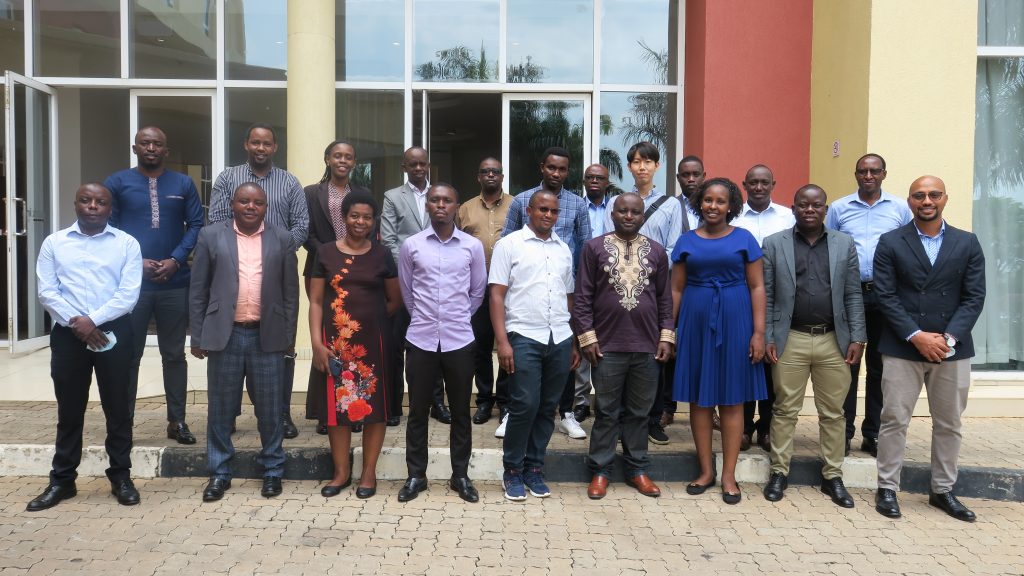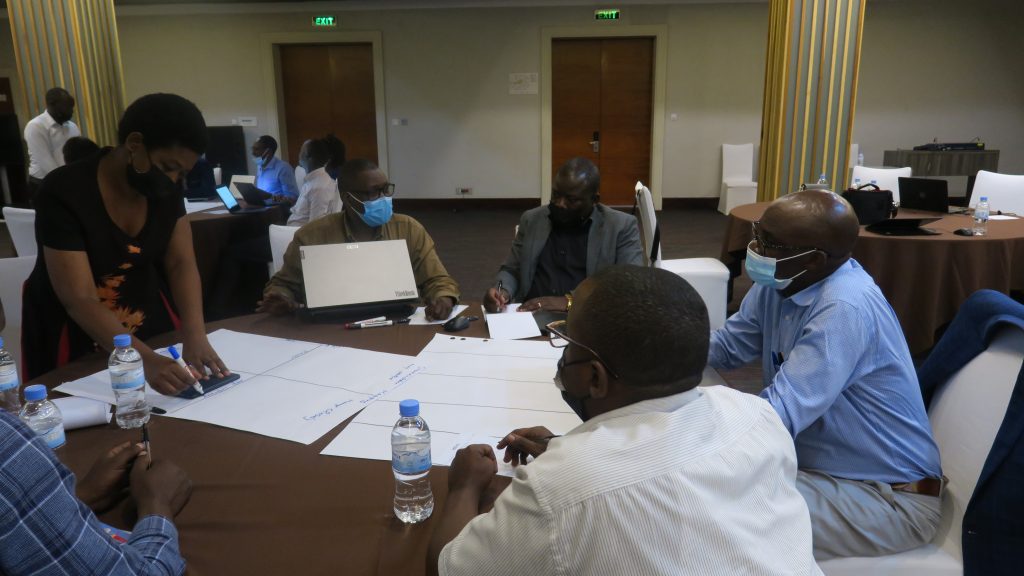15 Feb 2022, Kigali Rwanda the Global Green Growth Institute hosted the second technical working group on Waste to Resource Project. With the aim to update the members on the progress of implementation of the previous Technical Working Group’s recommendations, to review the capacity needs assessment for solid waste management preliminary study and review the Project Communication strategy and social behavior communication plan.
The Technical Working Group was attended by its members representing several institutions such as MoE, MININFRA, MINICT, CoK, RURA, REMA, NIRDA, FONERWA and private waste collection companies such as Ubumwe Cleaning, COPED, BAHEZA and the GGGI Rwanda Project Team.

On behalf of GGGI Rwanda , Mr MUKURARINDA Juvenal, Senior Officer – Sustainable Waste Management welcomed all the members of the Technical Working Group and highlighted the key points to be discussed during the meeting, encouraging all to participate in the discussion as they represent their organizations that are key stakeholders in the project.
Mr. KARURANGA Dismas from the Ministry of Environment , as the focal point of the Waste to Resource Project gave the opening remarks. He reminded the audience that the Waste to Resource project was launched in September 2021. He reminded the members that the project is responding to the issues of solid waste management in Rwanda. He said that the Technical Working Group was proposed by the Advisory body to help in reviewing documents and submit them to the advisory body for taking decisions and any further action required during the rollout and implementation of the project. The first technical working group took place on 14th October 2021, the second technical working group was held to discuss the progress of implementation of the previous technical working group recommendations, to review the communication strategy and give inputs. He thanked all the participants for attending and requested for their full support in developing the necessary project documents and feedback from all stakeholders as it is key that all partners are involved and included throughout the project decision making process.
Mr Juvenal MUKURARINDA, the Senior Officer, Sustainable Waste management highlighted the implementation of the previous recommendations and gave a detailed presentation on the key activities , progress and way forward. During the Q&A session several matters were raised and discussed, such as the Waste collection companies that produce organic compost from food concerns on how to meet compost standards set by RBS? Since RBS has set standards of organic manure which is different from organic compost ; whether transport companies are ready to maintain the process of sorting wastes, if wastes are segregated at households. Is the facility ready to receive separated wastes? ; the representative of the City of Kigali, MUGABO John highlighted ongoing activities aiming at solving the issue of mixing wastes ; contracts for new waste collection companies will be developed for five years ; contracts will propose to have separated days for collecting each type of waste ; initiative to design sacs/bags, which prevent leakage, avoid any smells, and can be washed or re-used.
It was mentioned that their is an ongoing stud for the mentioned sacs/bags if sacs are proved to be efficient, then they will be given to companies and distributed to households. Those are provisions that are ongoing in the City of Kigali. Other queries that were raised were on targeted -e-waste and why not Hazardous wastes (medical and industrial wastes)?
It was said that the project team for Waste to Resource is in the process of hiring a consultant on e-waste assessment to know what types of e-waste exist in Rwanda and the quantity of e-wastes collected every day. The study will give details needed to prepare an inventory and data collection, and this will help in planning futures activities. The project started with e-wastes but will later include other studies.
Mr Juvenal MUKURARINDA, the Senior Officer, Sustainable waste management, introduced to the participants to the capacity needs assessment for sustainable waste management, to help identify gaps at each stage of waste management and propose training topics to build capacity of stakeholders on waste generation and separation, collection, transfer and transport, final disposal, treatment, recycling. During the technical working group he asked all participants tio complete an exercise of rating current practices done on waste management. Whilst participants were completing the rating table, it was said that the rating was very low in most of waste management practices such as waste segregation and storage at source, primary collection, street sweeping and drain cleaning, secondary waste storage depots and transfer stations, transportation, treatment, final disposal, capacity building, organizational structure, etc.
GGGI Rwanda Senior Officer- Communication Ms Pamela BIRUNGI led the session on Project Communication Strategy and Social behavior change communication on sustainable waste management. Participants were tasked to give inputs on draft communication strategy as the strategy aims to change the behavior of the public, develop key messages for the target audiences , identify the challenges in the current value chain and system , and help the public understand what they need to do to be informed and start participating from their households, schools, or work . Targeting community at household.

All participants completed a stakeholder mapping exercise, discussing who they think needs to be kept informed in waste management, those that are more involved in waste value chain and participants presented challenges faced at each step of waste management value chain to help identify a strategy that communications officers will agree to implement to help change behavior of citizens. Communication officers from Fonerwa, RURA, MoE supported the exercise in sharing their insights and inputs. Participants were grouped into 3 groups, each group composed of technical expert, communication expert and waste collection company. They gave their inputs on stakeholder mapping and highlighted challenges met at each stage of waste management stating what they think is critical in reaching out to the target audiences that will either have power as a stakeholder in the project or have more influence throughout the project.
The participants feedback was good indication of the necessary awareness and educational campaign that will help engage the citizens. The participants then moved onto the discussion of the next steps in the project and what will be required of the members once the seocond draft of the project communication plan has been shared for all to give input.
Mr Basile Uwimana , Communications Officer from Ministry of Environment gave the closing remarks applauding GGGI for the work hat has been done thus far and he encouraged the team to keep monitoring all activities and continue to engage with stakeholders at each phase of the project, he thanked all the participants as well for joining the days full discussion and said that the following recommendations will be taken forward by the project team:
GGGI is tasked to keep working closely with the City of Kigali, as the City of Kigali has other parallel projects on waste management to harmonize all projects related to waste management ; the project team to develop a clear plan and increase awareness on all stages of waste management including sorting at source point, storage, transportation, treatment and landfilling ; the project team to engaging with church leaders, schools, local government to have an effective national mass community awareness on social behavior change ; project team to consider previous recommendations given on solid waste management for further implementation ; to request RSB to search for food compost standards and have separate standards for food compost and manure compost and to develop tool that will show results from the project to show reduction in GHG Emissions.
The GGGI team agreed and gave specific deadlines on the next activities and documents that will be shared to the stakeholders in order to have the final documents ready by Mid March.